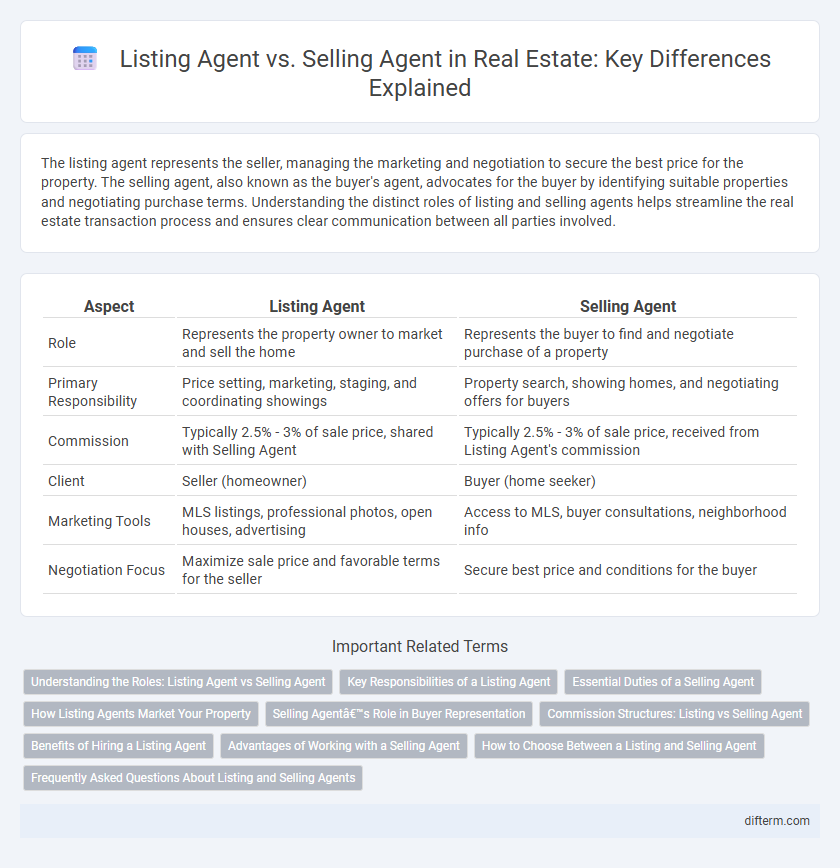The listing agent represents the seller, managing the marketing and negotiation to secure the best price for the property. The selling agent, also known as the buyer's agent, advocates for the buyer by identifying suitable properties and negotiating purchase terms. Understanding the distinct roles of listing and selling agents helps streamline the real estate transaction process and ensures clear communication between all parties involved.
Table of Comparison
| Aspect | Listing Agent | Selling Agent |
|---|---|---|
| Role | Represents the property owner to market and sell the home | Represents the buyer to find and negotiate purchase of a property |
| Primary Responsibility | Price setting, marketing, staging, and coordinating showings | Property search, showing homes, and negotiating offers for buyers |
| Commission | Typically 2.5% - 3% of sale price, shared with Selling Agent | Typically 2.5% - 3% of sale price, received from Listing Agent's commission |
| Client | Seller (homeowner) | Buyer (home seeker) |
| Marketing Tools | MLS listings, professional photos, open houses, advertising | Access to MLS, buyer consultations, neighborhood info |
| Negotiation Focus | Maximize sale price and favorable terms for the seller | Secure best price and conditions for the buyer |
Understanding the Roles: Listing Agent vs Selling Agent
A listing agent represents the property seller, managing marketing, pricing, and negotiations to secure the best offer. A selling agent works on behalf of the buyer, identifying suitable properties and guiding them through the purchasing process. Understanding these distinct roles is crucial for smooth real estate transactions and effective communication between all parties.
Key Responsibilities of a Listing Agent
The listing agent manages property marketing, pricing strategies, and coordinates showings to attract potential buyers. They prepare detailed listings, negotiate offers on behalf of the seller, and ensure compliance with legal and contractual obligations. Their role is crucial in maximizing the property's market exposure and achieving the best possible sale price.
Essential Duties of a Selling Agent
The selling agent's essential duties include representing the buyer's interests by conducting property searches that match client criteria and negotiating purchase offers to secure favorable terms. They coordinate property showings, provide market analysis, and ensure all contractual obligations are fulfilled during the transaction process. Selling agents also facilitate communication between buyers, listing agents, and mortgage lenders to streamline closing procedures and protect client investments.
How Listing Agents Market Your Property
Listing agents utilize professional photography, virtual tours, and targeted social media campaigns to maximize property visibility and attract qualified buyers. They leverage multiple listing services (MLS) and network with other real estate professionals to broaden the reach of the property. By crafting compelling property descriptions and coordinating open houses, listing agents create strategic marketing plans designed to sell homes quickly and at optimal prices.
Selling Agent’s Role in Buyer Representation
The selling agent plays a crucial role in buyer representation by advocating for the buyer's interests throughout the real estate transaction, including identifying suitable properties and negotiating purchase terms. They conduct market analysis to ensure competitive offers and coordinate inspections, financing, and closing processes to safeguard the buyer's investment. Effective selling agents have in-depth knowledge of local markets and legal requirements, enhancing the buyer's chances of a successful and satisfactory property purchase.
Commission Structures: Listing vs Selling Agent
Listing agents typically receive a commission percentage based on the total sale price agreed upon in the listing agreement, often shared with the selling agent upon closing. Selling agents earn a portion of the commission as a buyer's agent, incentivizing them to secure favorable offers while ensuring the transaction completes efficiently. Commission structures vary by market but commonly range between 5% to 6% of the sale price, split equally or negotiated between the listing and selling agents.
Benefits of Hiring a Listing Agent
Hiring a listing agent provides expert market analysis to price your property competitively and attract qualified buyers quickly. They leverage professional networks and marketing strategies, including MLS listings and virtual tours, to maximize property visibility and expedite sales. Experienced listing agents negotiate effectively on your behalf, ensuring you receive the best possible offers and terms.
Advantages of Working with a Selling Agent
A selling agent provides personalized guidance and expert negotiation skills tailored to the buyer's needs, enhancing the chances of securing the best deal. Their deep knowledge of market trends and property values allows buyers to make informed decisions, avoiding overpaying or costly mistakes. Buyers working with selling agents also benefit from access to off-market listings and exclusive opportunities not always available through listing agents.
How to Choose Between a Listing and Selling Agent
Choosing between a listing agent and a selling agent depends on whether you are selling or buying a property, as listing agents represent sellers and selling agents represent buyers. Evaluate agents based on their local market expertise, client reviews, negotiation skills, and track record of successful transactions in your target area. Prioritize clear communication and alignment with your goals to ensure a smooth real estate transaction.
Frequently Asked Questions About Listing and Selling Agents
Listing agents represent home sellers, managing property marketing, pricing, and negotiations to attract potential buyers, while selling agents (or buyer's agents) assist buyers in finding suitable properties and negotiating purchase terms. Frequently asked questions often address commission fees, responsibilities during the transaction, and how dual agency situations are handled when one agent represents both parties. Understanding these roles helps clients navigate real estate transactions more effectively and ensures clear expectations throughout the buying or selling process.
Listing Agent vs Selling Agent Infographic

 difterm.com
difterm.com